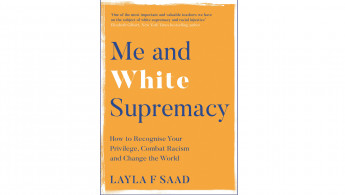Me and White Supremacy: Giving white people the tools to see their own white privilege
In a 2016 essay, Booker Prize-winning author Marlon James said that it wasn't the job of people of colour to solve racism. "It's not for the black person to be more open-minded," he wrote. "It's for the white person to be less racist."
James was lamenting the number of diversity panels that were being held at the time, and the fact that he and other writers of colour were constantly being asked to speak on them.
"The problem with me coming to the table to talk about diversity is the belief that I have some role to play in us accomplishing it, and I don't," he wrote in the essay. "And the fact that I have to return to that table often should be proof that such discussions aren't achieving what they are supposed to."
He's right. It's not the job of black and brown people to combat racism, just like it's not the job of Jewish people to stop anti-Semitism or LGBTQ people to solve homophobia.
But, and this has become particularly clear in the past couple of weeks in the UK in particular, there are many white people who don't want to solve racism. In fact, an arguable bigger problem is the fact that they deny the very existence of racism, which makes it virtually impossible to solve.
 |
There are many white people who don't want to solve racism |  |
When the Duke and Duchess of Sussex announced this month that they planned to step back from the Royal Family, the outcry was immediate. While many people understood that racism against Meghan Markle had contributed to the couple's decision, others (read: mainly white men) refused to believe that Markle had been subjected to any kind of discriminatory behaviour.
On ITV's This Morning, Philip Schofield said he'd never seen any evidence of racism against Markle and asked Dr Shola Mos-Shogbamimu for examples, while on Good Morning Britain, Piers Morgan entered into a shouting match with writer Afua Hirsch when she accused him of being racist. And actor Laurence Fox, appearing on Question Time, said university lecturer Rachel Boyle was racist when she noted that he was a "white privileged male".
All these men could do with reading Layla F Saad's Me and White Supremacy, a book which aims to give white people the tools they need to see their own white privilege and how they uphold a system of white supremacy, even if they don't see themselves as personally racist.
Me and White Supremacy was born out of an Instagram challenge run by Saad, and follows the same format: over 28 days white people, and those who pass as white, are walked through the many facets that make up white supremacy, from tone policing to white fragility to optical allyship.
At the end of each day's section are a series of questions from Saad which force the reader to examine their own behaviours and thoughts.
The result, Saad hopes, are readers more conscious of how they uphold white supremacist ideas and power structures, and who can now do their bit to help dismantle them.
 |
|
| Me and White Supremacy by Layla F Saad is out on January 28 (£14.99, Quercus) |
Saad's book follows a number of excellent non-fiction titles which have addressed race in the last few years, from Reni Eddo-Lodge's Why I'm No Longer Talking to White People About Race to Hirsch's Brit(ish) and Akala's Natives.
Me and White Supremacy moves the discussions in those books on to a point of action; readers of Saad's book are expected to actively participate in the work the book lays out, and to feel uncomfortable doing so.
The work, says Saad in her introduction, will bring up a myriad of feelings, including shame, remorse and grief. It's those very feelings that often prevent people with white privilege from confronting racism and white supremacy, instead choosing to deny its existence or act like being called a racist is worse than actually being a racist (all things that Saad addresses through the various steps in the book).
As someone who doesn't hold white privilege and who the book is therefore not addressing (although I'd argue that many Asian people should read and engage with the chapters on anti-Blackness, as this is something that's rife in Asian communities), I'm intrigued to see how Me and White Supremacy is received.
It's a thorough and engaging book, and one that has the potential to make a real difference. It's confrontational, but with the substance to back up its arguments, and it will force those who read it to really examine their behaviours.
It's a book that should be sent to the likes of Schofield, Morgan and Fox, but unfortunately, they'd likely not entertain its premise. But if enough people around them take on the work laid out in Me and White Supremacy, then soon they and white people like them will find themselves alone and unable to get any traction for their views. And wouldn't that be a good thing?
Sarah Shaffi is a freelance literary journalist and editor. She writes about books for Stylist Magazine online and is books editor at Phoenix Magazine. She is a judge for the Jhalak Prize 2019. Sarah is editor-at-large at independent children's publisher Little Tiger Group. She regularly chairs author events, and is co-founder of BAME in Publishing, a networking group for people of colour in publishing.
Follow her on Twitter: @sarahshaffi
The New Arab Book Club: Click on our Special Contents tab to read more book reviews and interviews with authors:




